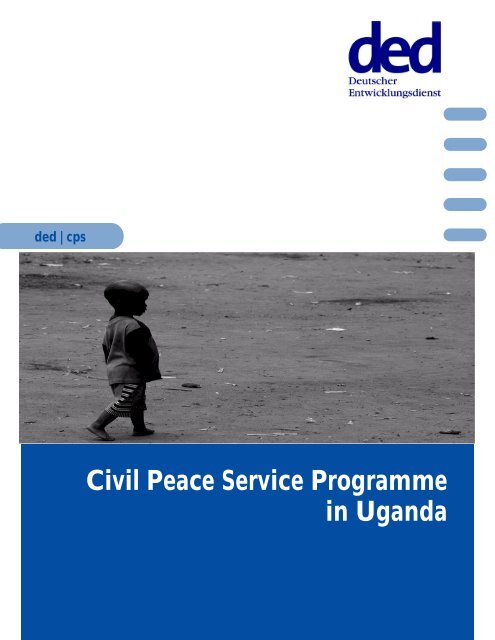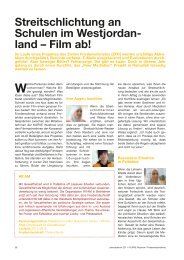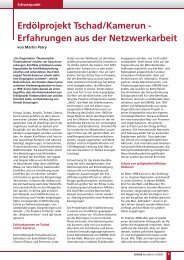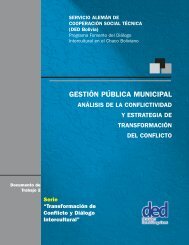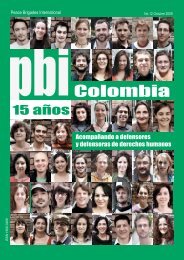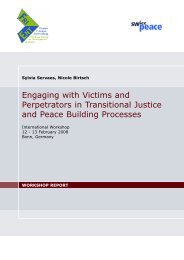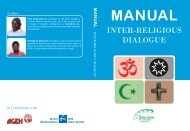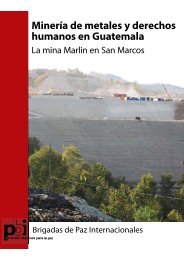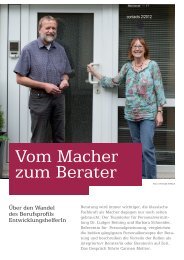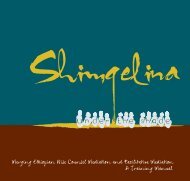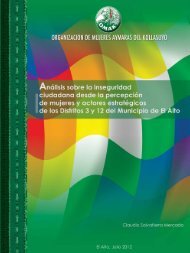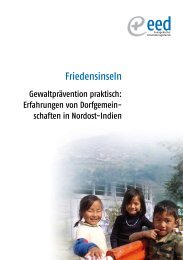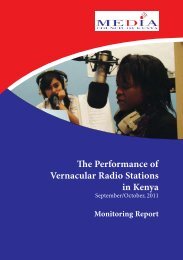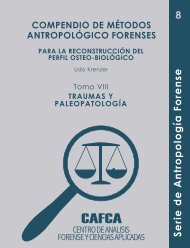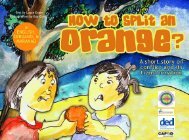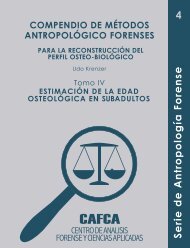Civil Peace Service Programme in Uganda - Ziviler Friedensdienst
Civil Peace Service Programme in Uganda - Ziviler Friedensdienst
Civil Peace Service Programme in Uganda - Ziviler Friedensdienst
Create successful ePaper yourself
Turn your PDF publications into a flip-book with our unique Google optimized e-Paper software.
ded | cps<br />
<strong>Civil</strong> <strong>Peace</strong> <strong>Service</strong> <strong>Programme</strong><br />
<strong>in</strong> <strong>Uganda</strong>
<strong>Civil</strong> <strong>Peace</strong> <strong>Service</strong> <strong>Programme</strong> <strong>in</strong> <strong>Uganda</strong><br />
<strong>Civil</strong> <strong>Peace</strong> <strong>Service</strong> <strong>Programme</strong> <strong>in</strong> <strong>Uganda</strong><br />
S<strong>in</strong>ce August 2000, DED's <strong>Civil</strong> <strong>Peace</strong> <strong>Service</strong> <strong>Programme</strong> (CPS) has deployed <strong>Peace</strong><br />
Advisors, promoted local peace <strong>in</strong>itiatives and supported <strong>in</strong>stitutions <strong>in</strong> <strong>Uganda</strong> to f<strong>in</strong>d nonviolent<br />
ways of resolv<strong>in</strong>g conflicts. The service<br />
concentrates on peace education and the promotion<br />
of trust between conflict<strong>in</strong>g parties.<br />
Projects and Team<br />
The <strong>Civil</strong> <strong>Peace</strong> <strong>Service</strong> is currently active with<br />
five peace advisors and one junior expert <strong>in</strong> the<br />
regions of West Nile, Northern <strong>Uganda</strong>, Teso-<br />
Karamoja and Kampala. The national coord<strong>in</strong>ator<br />
supports the projects from the DED country office <strong>in</strong><br />
Kampala. The CPS <strong>Programme</strong> will be extended <strong>in</strong> the<br />
two current operational areas, West Nile and Teso-<br />
Karamoja regions. By the end of 2009 eight<br />
development workers will be work<strong>in</strong>g <strong>in</strong> the field of<br />
Work<strong>in</strong>g for <strong>Peace</strong> –<br />
<strong>Civil</strong> <strong>Peace</strong> <strong>Service</strong> <strong>Programme</strong> <strong>in</strong> <strong>Uganda</strong><br />
civil peace. The program’s future focus will be on reconciliation at community level, peace<br />
tra<strong>in</strong><strong>in</strong>g programmes and regional peaceful development.<br />
Current projects supported by DED <strong>Civil</strong> <strong>Peace</strong> <strong>Service</strong><br />
■ Promotion of <strong>Peace</strong>ful Co-Existence <strong>in</strong> Teso/Karamoja<br />
■ Master of Arts <strong>in</strong> <strong>Peace</strong> and Conflict Studies at Makerere University <strong>in</strong> Kampala<br />
■ Community Outreach <strong>Peace</strong> Project at Gulu University's Institute of <strong>Peace</strong> and<br />
Strategic Studies<br />
■ Conflict Management <strong>in</strong> Adjumani District<br />
■ West-Nile-Initiative to Promote Susta<strong>in</strong>able <strong>Peace</strong> and Equitable Development<br />
■ <strong>Peace</strong> Build<strong>in</strong>g <strong>in</strong> Paidha<br />
Work<strong>in</strong>g for <strong>Peace</strong><br />
To date, more than € 2.000.000 have been <strong>in</strong>vested <strong>in</strong> projects and <strong>in</strong>frastructure. The<br />
projects are supported by experienced <strong>Civil</strong> <strong>Peace</strong> <strong>Service</strong> advisors who live and work <strong>in</strong> the<br />
respective regions. The <strong>Peace</strong> advisors are work<strong>in</strong>g with<strong>in</strong> the partner organizations and are<br />
support<strong>in</strong>g the peace activities.<br />
Some of the impacts created so far are:<br />
■ a peace deal with the former rebel group <strong>Uganda</strong> National Rescue Front II (UNRF II)<br />
was signed <strong>in</strong> West-Nile;<br />
■ over 7.100 people are liv<strong>in</strong>g together <strong>in</strong> peaceful coexistence <strong>in</strong> the formerly<br />
deserted border region of Teso/Karamoja;<br />
■ people are gett<strong>in</strong>g proactive and <strong>in</strong>volved <strong>in</strong> <strong>Uganda</strong>’s national reconciliation<br />
process and skills <strong>in</strong> conflict resolution have been <strong>in</strong>quired.<br />
Contact<br />
Stefan Friedrichsen │ DED CPS National Coord<strong>in</strong>ator │ email: stefan.friedrichsen@ded.de<br />
CPS website<br />
http://uganda.ded.de > “Other <strong>Programme</strong>s” > “DED <strong>Civil</strong> <strong>Peace</strong> <strong>Service</strong> <strong>Programme</strong>”
<strong>Civil</strong> <strong>Peace</strong> <strong>Service</strong> <strong>Programme</strong> <strong>in</strong> <strong>Uganda</strong><br />
■<br />
Promotion of <strong>Peace</strong>ful Co-Existence through Jo<strong>in</strong>t Rehabilitation of<br />
Water Dams <strong>in</strong> Teso-Karamoja<br />
Situation <strong>in</strong> operat<strong>in</strong>g area<br />
The Iteso and the Karimojong have a long history of conflict with frequent outbreaks of<br />
violence between the two ethnic groups and between different clans with<strong>in</strong> Karamoja. In<br />
recent decades the old tradition of cattle raids has become <strong>in</strong>creas<strong>in</strong>gly brutal as a result of an<br />
enormous <strong>in</strong>flux of weapons from neighbour<strong>in</strong>g conflict regions (Sudan, Somalia). Thousands<br />
of people <strong>in</strong> Teso have been forced to stay <strong>in</strong> IDP<br />
(Internally Displaced People) camps. While the Iteso<br />
have to a great extent given up cattle keep<strong>in</strong>g and<br />
<strong>in</strong>stead turned to agriculture many Karimojong still<br />
live a very traditional semi-nomadic lifestyle which<br />
is strongly focused on cattle. S<strong>in</strong>ce 2001, the<br />
<strong>Uganda</strong>n government is try<strong>in</strong>g to implement and<br />
robust disarmament exercise <strong>in</strong> Karamoja. Due to a<br />
multitude of reasons the success has been very<br />
limited so far.<br />
Interventions towards positive change<br />
The primary goal is to provide support <strong>in</strong> the<br />
efforts to harmonize the relationship between the<br />
conflict<strong>in</strong>g groups <strong>in</strong> the Teso-Karamoja region.<br />
Message for <strong>Peace</strong> –<br />
Released dur<strong>in</strong>g the <strong>Peace</strong> Day Celebrations <strong>in</strong><br />
Soroti 2005<br />
What are the impacts?<br />
Among the many activities that have been undertaken by the partners <strong>in</strong> <strong>Civil</strong> <strong>Peace</strong><br />
<strong>Service</strong> are regular tra<strong>in</strong><strong>in</strong>gs <strong>in</strong> “Alternatives to Violence”, <strong>Peace</strong> Education <strong>in</strong> over 100 schools<br />
<strong>in</strong> Teso-Karamoja, C<strong>in</strong>ema Education <strong>in</strong> various villages, the organization of meet<strong>in</strong>gs for<br />
community leaders and the establishment of a Jo<strong>in</strong>t Office <strong>in</strong> the small border town of Iriiri.<br />
S<strong>in</strong>ce 2007, a new program focuses on the crucial role of women <strong>in</strong> conflict resolution. In 2007<br />
the program “Promotion of <strong>Peace</strong>ful Co-Existence through Jo<strong>in</strong>t Rehabilitation of Water Dams”<br />
brought Iteso and Karimojong together <strong>in</strong> order to jo<strong>in</strong>tly work on dams <strong>in</strong> the border region.<br />
Permanent settlements on Teso and Karamoja side have been established and the situation <strong>in</strong><br />
the area has proven to be satisfactory peaceful and secure. Another cross regional program is<br />
the Teso Karamoja Region Action Plann<strong>in</strong>g “for promot<strong>in</strong>g peaceful coexistence”. Each district<br />
elected a peace monitor and action plans per district have been developed with the objective<br />
to <strong>in</strong>clude those activities <strong>in</strong> the overall district plans.<br />
Summary of Organizations<br />
DED’s <strong>Civil</strong> <strong>Peace</strong> <strong>Service</strong> is s<strong>in</strong>ce July 2005 work<strong>in</strong>g together with partners from both<br />
sides of the divide. Teso Initiative for <strong>Peace</strong> (TIP), a small NGO <strong>in</strong> Soroti, has become one of the<br />
best known peace organizations <strong>in</strong> the region <strong>in</strong> the last years. On Karamoja side Omaniman<br />
Community Development Initiative (OCODI), which is based <strong>in</strong> Moroto, has also become a very<br />
important partner <strong>in</strong> the peace efforts. With regard to activities <strong>in</strong> the Teso-Karamoja border<br />
region, Christian International <strong>Peace</strong> <strong>Service</strong> (CHIPS) has proven to be a vital partner <strong>in</strong> the<br />
implementation of programs.<br />
Contact<br />
Michael Odeke │ TIP Director │ email: tipteso@gmail.com │ http://teso<strong>in</strong>itiativeforpeace.com<br />
Timothy Sagal │ OCODI Director│ email:ocodi.lotome@gmail.com│http://ocodi-karamoja.com<br />
Edith Naser │ DED <strong>Peace</strong> Advisor │ email: edith.naser@ded.de
<strong>Civil</strong> <strong>Peace</strong> <strong>Service</strong> <strong>Programme</strong> <strong>in</strong> <strong>Uganda</strong><br />
■<br />
Master of Arts Course <strong>in</strong> <strong>Peace</strong> and Conflict Studies at Makerere<br />
University<br />
Interventions towards positive change<br />
The M.A. course <strong>in</strong> <strong>Peace</strong> and Conflict Studies at Makerere University Kampala <strong>in</strong>tegrates<br />
practical learn<strong>in</strong>g <strong>in</strong>to its curriculum and is an attempt to underp<strong>in</strong> a culture of peace and nonviolence<br />
<strong>in</strong> <strong>Uganda</strong>. Strong l<strong>in</strong>ks have been forged<br />
between the project and related NGOs <strong>in</strong> <strong>Uganda</strong>,<br />
and with other universities around the world. At<br />
Makerere, the <strong>Civil</strong> <strong>Peace</strong> <strong>Service</strong> has <strong>in</strong>vested<br />
heavily <strong>in</strong> the computer lab and library. DED has so<br />
far provided ten modern computers and about 900<br />
books on conflict resolution and related topics,<br />
which cannot be found <strong>in</strong> any other library <strong>in</strong><br />
<strong>Uganda</strong>.<br />
A peace newsletter is produced regularly,<br />
along with a database conta<strong>in</strong><strong>in</strong>g relevant<br />
documents and articles on peace and conflict<br />
issues. This regularly updated CD-ROM is designed<br />
to facilitate the learn<strong>in</strong>g experience of students,<br />
lecturers and members of the community. Field<br />
trips to conflict areas have also been conducted for the M.A. students. Furthermore, the<br />
production of teach<strong>in</strong>g material and attractive short courses on peace and conflict resolution<br />
are some of the unique features of the programme.<br />
The <strong>Civil</strong> <strong>Peace</strong> <strong>Service</strong> Project supports the M.A. programme to develop its full potential.<br />
Cooperation takes place with universities from all over the world, and connections to NGOs<br />
and Universities are regularly established and consolidated. These measures all aim at mak<strong>in</strong>g<br />
MAK a centre of excellence <strong>in</strong> the peace field, and at develop<strong>in</strong>g a culture of peace and nonviolence<br />
<strong>in</strong> Africa through the establishment of an “Institute for Religion and <strong>Peace</strong> Studies”.<br />
What are the impacts?<br />
Students and Lectures have realized that <strong>Peace</strong> Studies have to go hand <strong>in</strong> hand with<br />
practical skills. This development is reflected <strong>in</strong> the curricula. Strong relationships between the<br />
programme and society <strong>in</strong> general, politicians and NGOs <strong>in</strong> particular have been established.<br />
The <strong>Programme</strong> is play<strong>in</strong>g an important role <strong>in</strong> e.g. National Reconciliation.<br />
Summary of Organization<br />
The Master of Arts Degree <strong>in</strong> <strong>Peace</strong> and Conflict Studies is an<br />
<strong>in</strong>terdiscipl<strong>in</strong>ary programme which aims at giv<strong>in</strong>g graduates the pursuit of<br />
peace-build<strong>in</strong>g and methods of peaceful solutions to domestic, national,<br />
regional and <strong>in</strong>ternational conflicts.<br />
Contacts<br />
Dr. Paddy Musana │ Coord<strong>in</strong>ator │ email: musana@arts.mak.ac.ug<br />
Bangirana Narcisio │ Project Officer │ email: peaceresearch@arts.mak.ac.ug<br />
Barbara Kemper │ DED <strong>Peace</strong> Advisor │ email: peaceadvisor@arts.mak.ac.ug<br />
Homepage<br />
www.arts.mak.ac.ug/peace.html<br />
Creat<strong>in</strong>g a Centre of Excellence <strong>in</strong> the <strong>Peace</strong><br />
Field - M.A. <strong>Peace</strong> and Conflict Studies at<br />
Makerere University
<strong>Civil</strong> <strong>Peace</strong> <strong>Service</strong> <strong>Programme</strong> <strong>in</strong> <strong>Uganda</strong><br />
■<br />
Community Outreach <strong>Peace</strong> Project at Gulu University’s Institute of<br />
<strong>Peace</strong> and Strategic Studies<br />
Situation <strong>in</strong> operat<strong>in</strong>g area<br />
Northern <strong>Uganda</strong>, consist<strong>in</strong>g of several ethnic groups, has been plagued for over two<br />
decades with atrocities committed dur<strong>in</strong>g the war between the Lord’s Resistance Army (LRA)<br />
and Government Forces (UPDF). Over 1.8 Million people were forced to move their homes and<br />
resettle <strong>in</strong> Internally Displaced People’s Camps. S<strong>in</strong>ce July 2006, the Government of <strong>Uganda</strong><br />
and the LRA are negotiat<strong>in</strong>g for a comprehensive peace accord. S<strong>in</strong>ce then, the situation <strong>in</strong> the<br />
area has improved greatly. While the peace talks are go<strong>in</strong>g on with ups and downs the people<br />
of Northern <strong>Uganda</strong> feel much safer. Many are<br />
leav<strong>in</strong>g the camps now to go back to their fields<br />
dur<strong>in</strong>g the daytime and some of them even returned<br />
to their old home. However, even though there is<br />
peace at the moment, it is far away from positive<br />
peace. The 21-year conflict has left its traces <strong>in</strong> family<br />
structure, traditional sett<strong>in</strong>gs, political formations<br />
and ethnic identities. There is urgent need for peace<br />
build<strong>in</strong>g s<strong>in</strong>ce the population of Northern <strong>Uganda</strong> is<br />
long<strong>in</strong>g for susta<strong>in</strong>able peace.<br />
Interventions towards positive change<br />
The Community Outreach <strong>Peace</strong> Project (COPP)<br />
with support by the <strong>Civil</strong> <strong>Peace</strong> <strong>Service</strong> wants to have<br />
an impact on societal, <strong>in</strong>stitutional and <strong>in</strong>dividual<br />
levels <strong>in</strong> build<strong>in</strong>g a culture of peace <strong>in</strong> Northern<br />
<strong>Uganda</strong>.<br />
■ Outreach: Initiat<strong>in</strong>g and support<strong>in</strong>g community based peace build<strong>in</strong>g efforts<br />
through peace education, community <strong>in</strong>ter-cultural exchange, tra<strong>in</strong><strong>in</strong>gs and<br />
consultancies.<br />
■ Information & Documentation: Information documentation and dissem<strong>in</strong>ation<br />
through research and publication <strong>in</strong> the field of peace build<strong>in</strong>g and conflict<br />
transformation as well as establishment of a Community Resource Centre.<br />
■ Advocacy & Lobby<strong>in</strong>g: Establish<strong>in</strong>g partnerships with other universities, <strong>in</strong>stitutions<br />
and civil society organisations nationally and <strong>in</strong>ternationally to enhance advocacy<br />
and network<strong>in</strong>g that can <strong>in</strong>fluence policies and decision mak<strong>in</strong>g processes.<br />
Summary of Organization<br />
COPP is a new cooperation project between Gulu University’s Institute of<br />
<strong>Peace</strong> and Strategic Studies (IPSS) and the German Development <strong>Service</strong> and its<br />
<strong>Civil</strong> <strong>Peace</strong> <strong>Service</strong> Program. COPP’s overall goal is “to transform communities <strong>in</strong><br />
Northern <strong>Uganda</strong> for positive and susta<strong>in</strong>able peace through documentation,<br />
<strong>in</strong>formation and outreach programs.” COPP targets the generic community <strong>in</strong> Northern<br />
<strong>Uganda</strong> - Gulu University community, staff of non-governmental and community based<br />
organisations and all those who are <strong>in</strong>terested to enrich their knowledge <strong>in</strong> conflict<br />
management and peace build<strong>in</strong>g skills either for private or professional reasons.<br />
Contacts<br />
Fabius Okumu-Alya │ Director of IPSS │ email: fabokumu@yahoo.co.uk<br />
Simone Dornbach │ DED <strong>Peace</strong> Advisor │ email: simone.dornbach@ded.de<br />
Dur<strong>in</strong>g the project launch of COPP <strong>in</strong> 2008,<br />
the Guest of Honor the Ambassador of the<br />
Federal Republic of Germany to the Republic<br />
of <strong>Uganda</strong> is <strong>in</strong>troduced to the Acholi<br />
traditional justice methods.
<strong>Civil</strong> <strong>Peace</strong> <strong>Service</strong> <strong>Programme</strong> <strong>in</strong> <strong>Uganda</strong><br />
■<br />
Conflict Management <strong>in</strong> Adjumani District<br />
Situation <strong>in</strong> operat<strong>in</strong>g area<br />
The district of Adjumani has experienced <strong>in</strong>security s<strong>in</strong>ce 1986, caused by <strong>in</strong>surgencies<br />
<strong>in</strong> West-Nile and Acholi region as well as armed conflicts <strong>in</strong> Sudan and the Democratic<br />
Republic of Congo. The sign<strong>in</strong>g of the comprehensive peace accord between Northern and<br />
Southern Sudan and negotiations between the <strong>Uganda</strong>n central government and the LRA<br />
certa<strong>in</strong>ly had a positive impact on this situation. Nevertheless, the district is still fac<strong>in</strong>g major<br />
challenges. Besides the presence of around 27,000 refugees and approximately 20,000-30,000<br />
<strong>in</strong>ternally displaced peoples (IDPs), these <strong>in</strong>clude <strong>in</strong>creas<strong>in</strong>g conflict over land or diverg<strong>in</strong>g<br />
<strong>in</strong>terests among the local elites.<br />
Interventions towards positive change<br />
With the <strong>in</strong>tegration of a peace component<br />
<strong>in</strong>to the work of local adm<strong>in</strong>istration the <strong>Civil</strong> <strong>Peace</strong><br />
<strong>Service</strong> supports<br />
■ the development of a conflict monitor<strong>in</strong>g<br />
system for Adjumani District;<br />
■ the strengthen<strong>in</strong>g of capacity and or ethics<br />
and <strong>in</strong>tegrity respectively, at District and<br />
Sub-County government level;<br />
■ the effective function<strong>in</strong>g of traditional and<br />
official conflict resolution mechanisms and<br />
<strong>in</strong>stitutions.<br />
Ar<strong>in</strong>yapi Camp for Internally Displaced<br />
Persons (IDPs) <strong>in</strong> Adjumani District<br />
What are the impacts?<br />
The aim of the <strong>Civil</strong> <strong>Peace</strong> <strong>Service</strong> engagement is to strengthen the capacity of Adjumani<br />
district local government and District Disaster Management Committee respectively to<br />
effectively identify<strong>in</strong>g, prevent<strong>in</strong>g and/or settl<strong>in</strong>g conflicts. This aga<strong>in</strong> supports the district<br />
local government <strong>in</strong> realiz<strong>in</strong>g its mission, i.e. to plan and implement socio-economic<br />
development programs for improved and susta<strong>in</strong>able quality of life of the people of Adjumani<br />
District.<br />
Contacts<br />
Ben Olley Rob<strong>in</strong>son │ Chief District Planner │ email: olley_ben@yahoo.co.uk<br />
Habib Abubakar │ Assistant CAO/Vice-Chairperson of DDMC │ email: habradju@yahoo.com<br />
Kathr<strong>in</strong> Wyss │ DED <strong>Peace</strong> Advisor │ email: kathr<strong>in</strong>.wyss@ded.de
<strong>Civil</strong> <strong>Peace</strong> <strong>Service</strong> <strong>Programme</strong> <strong>in</strong> <strong>Uganda</strong><br />
■<br />
West-Nile-Initiative to Promote Susta<strong>in</strong>able <strong>Peace</strong> and Equitable<br />
Development<br />
Situation <strong>in</strong> operat<strong>in</strong>g area<br />
For more than 20 years the population of the West Nile Region suffered from armed<br />
conflicts between different rebel movements and the government. The civil war forced two<br />
thirds of the population to flee, expos<strong>in</strong>g the rest to extreme violence. The resettlement and<br />
re<strong>in</strong>tegration of <strong>in</strong>ternally displaced persons (IDPs) and ex-combatants will be the crucial<br />
factor for peace <strong>in</strong> the region. Insecurity is solidified by massive arms traffick<strong>in</strong>g through<br />
neighbor<strong>in</strong>g Democratic Republic of Congo and Southern Sudan.<br />
Interventions towards positive change<br />
MAYANNK is an <strong>in</strong>itiative of the seven West-Nile-Districts of Moyo, Arua, Yumbe,<br />
Adjumani, Nebbi, Nyadri and Koboko to promote susta<strong>in</strong>able peace and equitable<br />
development. Together with a DED <strong>Peace</strong> Advisor, MAYANNK supports the District<br />
governments to develop and implement a comprehensive peace and reconciliation strategy<br />
and to strengthen traditional conflict resolution mechanisms. In a jo<strong>in</strong>t and coord<strong>in</strong>ated effort<br />
and <strong>in</strong> collaboration with relevant partners MAYANNK focuses on the re<strong>in</strong>tegration and<br />
resettlement of ex-combatants and IDPs <strong>in</strong> order<br />
to enhance the peace build<strong>in</strong>g process.<br />
What are the impacts?<br />
The support of MAYANNK is the<br />
cont<strong>in</strong>uation of the <strong>Civil</strong> <strong>Peace</strong> <strong>Service</strong><br />
Engagement <strong>in</strong> Yumbe. DED has a successful<br />
history of support<strong>in</strong>g peace <strong>in</strong> the West Nile<br />
Region. Until recently, a peace advisor was<br />
work<strong>in</strong>g with the Participatory Rural Action for<br />
Development (PRAFORD), a civil society<br />
organization <strong>in</strong> Yumbe district. Amongst the<br />
impacts of the program are the resettlement and<br />
re<strong>in</strong>tegration of over 2500 rebels after the sign<strong>in</strong>g<br />
The Government of <strong>Uganda</strong> and UNRF II signed<br />
a cease fire and peace agreement <strong>in</strong> 2002 which<br />
has brought calm to the region<br />
of the cease fire and peace agreement <strong>in</strong> 2002; the communities are will<strong>in</strong>gly to accept the excombatants<br />
and now peacefully co-exist; and relative peace has led to attraction of several<br />
development partners and <strong>in</strong>vestors.<br />
Contact<br />
Ojok Bran │MAYANNK Assistant Chief Adm<strong>in</strong>istrative Officer │ email: ojokbran@yahoo.co.uk
<strong>Civil</strong> <strong>Peace</strong> <strong>Service</strong> <strong>Programme</strong> <strong>in</strong> <strong>Uganda</strong><br />
■<br />
<strong>Peace</strong> Build<strong>in</strong>g <strong>in</strong> Paidha<br />
Situation <strong>in</strong> the operat<strong>in</strong>g area<br />
Paidha is situated <strong>in</strong> the Southern part of Nebbi District, and is one of seven districts <strong>in</strong><br />
Northern <strong>Uganda</strong>’s West Nile region. The region is physically separated from the rest of<br />
<strong>Uganda</strong> by the river Nile and it borders the conflict-ridden Ituri Prov<strong>in</strong>ce of the Democratic<br />
Republic of Congo as well as Southern Sudan. Be<strong>in</strong>g a post-conflict society, Nebbi District is, as<br />
are many of the neighbour<strong>in</strong>g districts, struggl<strong>in</strong>g with a range of issues manifest<strong>in</strong>g<br />
themselves <strong>in</strong> different degrees of conflict, i.e.<br />
ethnic marg<strong>in</strong>alisation, resource scarcity and<br />
unequal land distribution, political tensions and<br />
ignorance, proliferation of small arms and light<br />
weapons, poverty and unemployment.<br />
In recent years poachers have lost their lives<br />
while attempt<strong>in</strong>g to hold on to their traditional<br />
hunt<strong>in</strong>g activities <strong>in</strong> Murchison Falls National Park,<br />
while women have been raped collect<strong>in</strong>g firewood<br />
<strong>in</strong> the now government run Lendu Forest. Lately<br />
school pupils throughout the district have begun<br />
copy<strong>in</strong>g the country’s university students and<br />
react<strong>in</strong>g to disagreements with school<br />
adm<strong>in</strong>istration with violence and strikes. Another<br />
Communities participate <strong>in</strong> the plann<strong>in</strong>g of<br />
development programmes and peace<br />
<strong>in</strong>itiatives<br />
worry<strong>in</strong>g development is the persistent talk on the street of, <strong>in</strong> the image of Kenya and<br />
Zimbabwe, prepar<strong>in</strong>g violently for the general elections <strong>in</strong> 2011.<br />
Interventions towards positive change<br />
DED <strong>Civil</strong> <strong>Peace</strong> <strong>Service</strong> is support<strong>in</strong>g the local non-governmental organisation Life<br />
Concern (LICO) <strong>in</strong> Paidha with an International <strong>Peace</strong> Advisor as well as a Local <strong>Peace</strong> Advisor.<br />
The overall goal of their efforts is to improve local conflict management skills among all<br />
stakeholders and <strong>in</strong>crease the participation of the communities <strong>in</strong> the plann<strong>in</strong>g,<br />
implementation, monitor<strong>in</strong>g and evaluation of the peaceful development of their area.<br />
The daily work is focus<strong>in</strong>g on the establishment, tra<strong>in</strong><strong>in</strong>g and promotion of<br />
comprehensive networks of local mediators, so-called Community Messengers for <strong>Peace</strong>, <strong>in</strong> the<br />
Park and Forest areas; the preparation and encouragement of school pupils as tolerant and<br />
creative mediators <strong>in</strong> their schools; and the creation and coach<strong>in</strong>g of an <strong>in</strong>ter-party forum of<br />
politicians work<strong>in</strong>g towards non-violent elections <strong>in</strong> 2011.<br />
Contacts<br />
William Anyolitho | LICO Executive Director | email: lifeconcern2004@yahoo.co.uk<br />
Albert Ogwiri | LICO Local <strong>Peace</strong> Advisor | email: ogwiri@gmail.com<br />
Gedske Messell | DED International <strong>Peace</strong> Advisor | email: gedske.messell@ded.de


